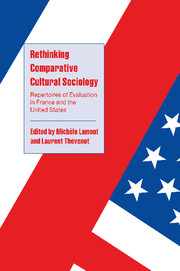Book contents
- Frontmatter
- Contents
- Notes on contributors
- Acknowledgements
- 1 Introduction: toward a renewed comparative cultural sociology
- Part I Race, gender, and multiculturalism
- Part II The cultural sphere: publishing, journalism, and the arts
- 5 Culture or commerce? Symbolic boundaries in French and American book publishing
- 6 Involvement and detachment among French and American journalists: to be or not to be a “real” professional
- 7 From rejection of contemporary art to culture war
- Part III Political cultures and practices
- Conclusion: Exploring the French and the American polity
- References
- Index
6 - Involvement and detachment among French and American journalists: to be or not to be a “real” professional
Published online by Cambridge University Press: 26 March 2010
- Frontmatter
- Contents
- Notes on contributors
- Acknowledgements
- 1 Introduction: toward a renewed comparative cultural sociology
- Part I Race, gender, and multiculturalism
- Part II The cultural sphere: publishing, journalism, and the arts
- 5 Culture or commerce? Symbolic boundaries in French and American book publishing
- 6 Involvement and detachment among French and American journalists: to be or not to be a “real” professional
- 7 From rejection of contemporary art to culture war
- Part III Political cultures and practices
- Conclusion: Exploring the French and the American polity
- References
- Index
Summary
French people want to read journalists that take a stand. Why? In contrast, Americans only want to learn factual information from their newspaper. They believe that opinions expressed by the journalist on this information are not even worth reading. Their democratic culture leads them to believe that they know what is going on as much, if not better, than journalists do. But the French also define themselves as having a democratic culture. Where does the difference come from?
Max Weber, Talk presented at first meeting of German Sociology (1910)A writer for the French newspaper Libération declares flatly, “My opinion, my personal opinion, is my private business,” drawing a firm boundary between politics and journalism. Across the Atlantic, an editor at Fortune Magazine voices a strikingly similar sentiment, explaining that the media “need to be free of any kind of partisan or religious or parochial kinds of concerns.” In different ways, both journalists are articulating rules for professional life.
What does it mean to be a professional journalist? How do notions of journalistic professionalism differ across national contexts? This study is an exploration of how twenty-four French and American journalists from across the political spectrum talk about what it means to be a professional.
It is commonplace for media sociologists to contrast American journalism's emphasis on objectivity with European journalism's greater openness to the opinions of the reporter. This comparison is usually centered around the distinction between facts and values. While Americans are said to make a fetish of empirical “facts,” Europeans are more willing to allow for the intrusion of the reporter's own “values” into the story.
- Type
- Chapter
- Information
- Rethinking Comparative Cultural SociologyRepertoires of Evaluation in France and the United States, pp. 148 - 169Publisher: Cambridge University PressPrint publication year: 2000
- 7
- Cited by



